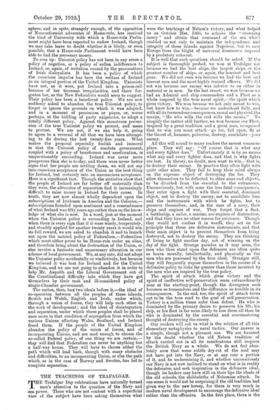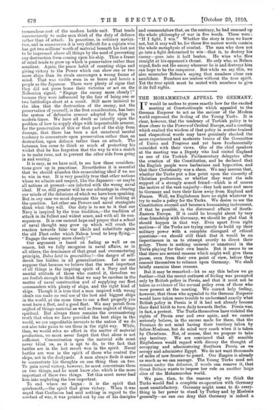THE TEACHINGS OF TRAFALGAR.
!TIRE Trafalgar Day celebrations have naturally turned 1 men's attention to the question of the Navy, and sea power. Those who are not content with a superficial view of the subject have been asking themselves what were the teachings of Nelson's victory, and what helped us on October 21st, 1805, to achieve the "crowning mercy" and obtain that command of the sea, which enabled us not only to maintain the independence and integrity of these islands against Napoleon, but to save Europe from the blight of universal dominance imposed by a predatory autocrat.
It is well that such questions should be asked. If the subject is thoroughly probed, we won at Trafalgar not because we had the best ships, the largest ships, or the greatest number of ships, or, again, the heaviest and best guns. We did not even win because we had the best and bravest men and the most highly trained officers. We did not win because our enemy was inferior to us either in material or in men. In the last resort, we won because we had an Admiral and ship commanders and a Fleet as a whole inspired by the true naval spirit,—the spirit which gives victory. We won because we not only meant to win, but knew' how to win,—because we understood fully, and with all its tremendous consequences, moral and physical, the maxim, "He who wills the end wills the means." To simplify the matter still further, we won because our Fleet, inspired by a great tradition and a great man, recognised that to win you must attack—go for, fall upon, fly at the throat of, hammer, pulverise, destroy, annihilate—your enemy.
All this will sound to many readers the merest common- place. They will say : "Of course that is what any and every fighter does." Unfortunately it is by no means what any and every fighter does, and that is why fights are lost. In theory, no doubt, men want to win,—that is, to destroy their enemy. In practice they often fight with quite other aims. They fail to keep their mind always on the supreme object of destroying the foe. They allow themselves to be deflected to other aims and objects, to be diverted from the essential to the extraneous. Unconsciously, but with none the less fatal consequences, they enter upon a fight with their essential, dominant object, not to destroy the enemy, not to annihilate him and the instruments with which he fights, but to preserve themselves, and, in the case of a navy, their ships and engines of war. They forget that a fleet, a battleship, a sailor, a marine, are engines of destruction, and that they have no other reason for existence. Though they would not confess it in word, they act on the principle that these are defensive instruments, and that their main object is to prevent themselves from being destroyed, not to destroy the enemy. They are thinking of living to fight another day, not of winning on the day of the fight. Strange paradox as it may seem, the men who thus stand upon the defensive are often quite as brave morally, intellectually, and physically as the men who are possessed by the true ideal. Stranger still, they will frequently expose themselves in the course of a, defensive policy to risks far greater than those incurred by the men who are inspired by the true policy. The spirit of attack which gives victory and the spirit of ineffective self-preservation seem extraordinarily near at the starting-point, though the divergence soon becomes so tremendous and the difference so terrible in its consequences. In the end, too, the spirit of attack turns out to be the true road to the goal of self-preservation. Victory is a million times safer than defeat. He who is dominated by the primary desire to preserve his life, his ship, or his fleet is far more likely to lose them all than he who is dominated by the essential and overmastering thought of destroying the enemy. Our readers will ask us what is the relation of all this elementary metaphysics to naval tactics. Our answer is a simple, though not a pleasant one. We are haunted by the doubt whether the old Nelson tradition of attack carried out in all its ramifications still inspires the British Navy as a whole. We do not feel abso- lutely sure that some subtle dry-rot of the soul may not have got into the Navy, or at any rate a portion of it, and be undermining it, and whether unconsciously our Navy is not now inclined to stand on what is in reality the defensive, and seek inspiration in the defensive ideal, though its leaders may have still on their lips the ideals of the old schools, the shibboleths of Nelsoniaaa attack. In one sense it would not be surprising if the old tradition bad given way to the new heresy, for there is very much in modern naval development to encourage the defensive ideal rather than the offensive. In the first place, there is the tremendous cost of the modern battle unit. That tends unconsciously to make men think of the duty of defence Tather than of attack. In peacetime, in ordinary naviga- tion, and in manceuvres it is very difficult for a captain who has got two millions' worth of material beneath his feet not to be impressed above all things by the need of preventing any destruction from coming upon his ship. Thus a frame of mind tends to grow up which is preservative rather than assailant. Again, the peace habit of counting ships and giving victory to the Power which can show one or two more ships than its rivals encourages a wrong frame of mind. That was visible even in so brave and heroic a people as the Japanese. There were plenty of signs that they did not press home their victories or act on the Nelsonian signal, "Engage the enemy more closely !" because they were influenced by the fear of being one or two battleships short at a count. Still more inimical to the idea that the destruction of the enemy, not the preservation of yourself, is the first consideration, has been the system of defensive armour adopted for ships in modern times. We have all dwelt so intently upon the problem of how to supply ships with impenetrable armour, for the preservation of this or that part of the ship from damage, that there has been a not unnatural mental tendency to concentrate upon preservation rather than on destruction, upon defence rather than on attack. The batsman has come to think so much of protecting his wicket that he has forgotten that the way to win a match is to make runs, not to prevent the other side from going in and scoring. It is easy, as we have said, to see how these considera- tions grow up in peacetime. Nevertheless it is essential that we should abandon this emasculating ideal if we are to win in war. It is very possibly true that other nations whom we admire and respect, like the Japanese—or maybe all nations at present—are infected with the wrong naval ideal. If so, still greater will be our advantage in clearing our minds of the delusions of which we have been speaking. But in any case we must deprecate this way of looking at the question. Let other sea Powers and naval strategists think what they will. Our duty is to see to it that our Navy is inspired by the true tradition,—the tradition of attack in its fullest and widest sense, and with all its con- sequences. It is our earnest hope and prayer that a school of naval thought may grow up which will crush the reaction towards false war ideals and substitute again the old Fleet order which Nelson loved to keep flying,— " Engage the enemy more closely !" Our argument is based on feeling as well as on reason, but we fully recognise in naval affairs, as in all others, the dominance of that great and overmastering principle, Dolus latet in generalibus 1—the danger of self- deceit lies hidden in all generalisations. Let no one suppose that because we believe that the most important of all things is the inspiring spirit of a Navy and the mental attitude of those who control it, therefore we are foolish enough to think that we may be careless in the matter of naval construction and of supplying our fleet commanders with plenty of ships, and the right kind of ships. Though it is true that a man inspired with wrong ideals can make no real use of the best and biggest ships in the world, at the same time to use a fleet properly you must have a fleet, and a good fleet. We may perish from neglect of things material as well as from neglect of things spiritual. But always there remains the overmastering truth that when we have provided the best ships in the world, we are unprofitable servants to the nation if we do not also take pains to use them in the right way. While, then, we would relax no effort in the matter of material production, we must never forget that that alone is not sufficient. Concentration upon the material side must never blind us, as it is apt to do, to the fact that battles are in the last resort won in the spirit. Naval battles are won in the spirit of those who control the ships, not in the dockyards. A man always finds it easier to concentrate his thoughts on one thing than on two. To gain naval victory, however, he must concentrate them on two things, and he must know also which is the more important of these two things. Yet this must never lead him into neglecting the less important.
To end where we began : it is the spirit that quiekeneth,—the spirit that gives victory. When it was urged that Confucius had said nothing in regard to the conduct of war, it was pointed out by one of his disciples and commentators that, on the contrary, he had summed up the whole philosophy of war in five words. These were : "If I fight, I win." Whether the story is true we know not, but it may well be, for those five narrow words contain the whole metaphysic of combat. The man who does not go into a tight determined to win—that is, to destroy his enemy—goes into it half beaten. He wins who flies straight at his opponent's throat. He only who, as Nelson urged, finds out the enemy wherever he is and destroys him can hope to be the conqueror. But while we say this, we also remember Nelson's saying that numbers alone can annihilate. Numbers are useless without the true spirit. Yet the true spirit must be mated with numbers to give it its full rights.















































 Previous page
Previous page